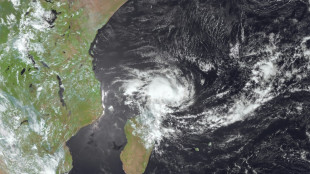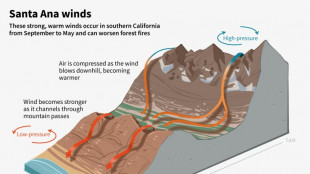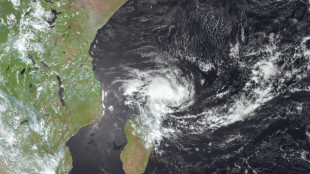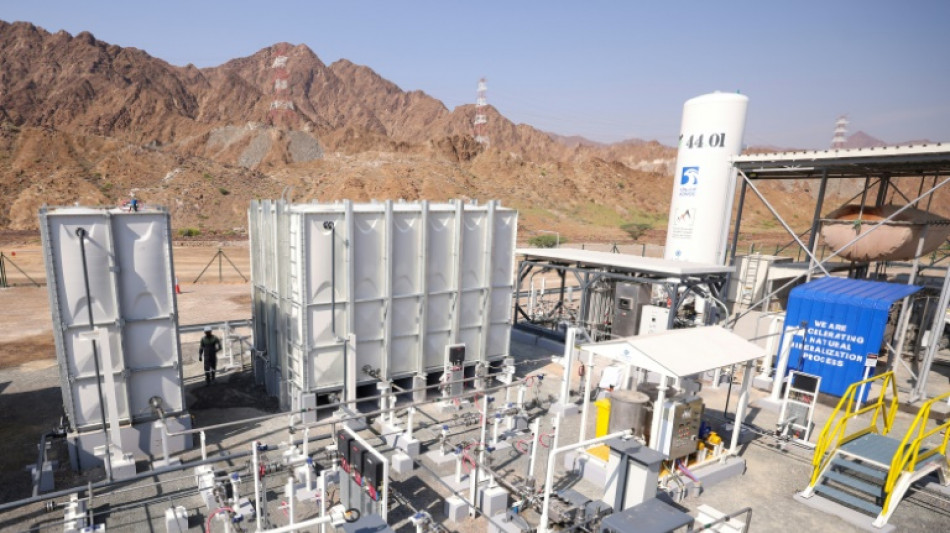
-
 Man City's Premier League title defence is over: Foden
Man City's Premier League title defence is over: Foden
-
Society centred around women in UK during Iron Age: scientists
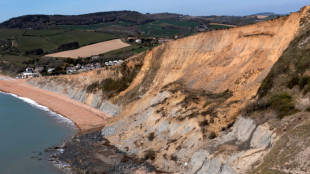
-
 UK government bans 'zombie drug' xylazine
UK government bans 'zombie drug' xylazine
-
Israel, Hamas agree deal for Gaza truce, hostage release: source briefed on talks

-
 Kosovo raids Serbia-linked offices as tense elections loom
Kosovo raids Serbia-linked offices as tense elections loom
-
Social media star Maher says rugby union must do more to grow game

-
 Upping defence spending 'key point' for NATO summit: ministers
Upping defence spending 'key point' for NATO summit: ministers
-
Russian inflation climbs as Ukraine offensive weighs on economy

-
 South Africa's Nortje ruled out of Champions Trophy
South Africa's Nortje ruled out of Champions Trophy
-
US bans controversial red food dye, decades after scientists raised alarm

-
 Rubio says China cheated its way to power, rejects 'liberal world order'
Rubio says China cheated its way to power, rejects 'liberal world order'
-
US bank profits rise as Wall Street hopes for merger boom

-
 Methane leaks from Nord Stream pipeline blasts revised up: studies
Methane leaks from Nord Stream pipeline blasts revised up: studies
-
Humanity has opened 'Pandora's box of ills,' UN chief warns
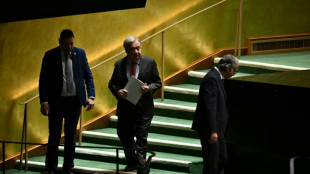
-
 US tightens controls on advanced chips to curb flow to China
US tightens controls on advanced chips to curb flow to China
-
Death toll at illegal S.African mine reaches 78

-
 Nigeria atheist defiant after leaving jail in high-profile blasphemy case
Nigeria atheist defiant after leaving jail in high-profile blasphemy case
-
Humanity has opened 'Pandora's box of ills:' UN chief

-
 US bans red food dye over possible cancer risk: health authorities
US bans red food dye over possible cancer risk: health authorities
-
US consumer inflation rises December but underlying pressures ease

-
 McIlroy and Rahm set for top-level meeting in Dubai
McIlroy and Rahm set for top-level meeting in Dubai
-
Stock markets get boost from bank earnings, inflation data

-
 TikTok plans total US shutdown as ban deadline looms: report
TikTok plans total US shutdown as ban deadline looms: report
-
Ghana to probe former president's huge cathedral project

-
 Easterby sticks by Six Nations-winning veterans in first Irish squad
Easterby sticks by Six Nations-winning veterans in first Irish squad
-
Scotland recall Jonny Gray for Six Nations

-
 UN rights chief says transitional justice 'crucial' in Syria
UN rights chief says transitional justice 'crucial' in Syria
-
US consumer inflation rises to 2.9 percent in December

-
 Germany's Thiaw to miss Juve and Champions League clashes with hamstring injury: AC Milan
Germany's Thiaw to miss Juve and Champions League clashes with hamstring injury: AC Milan
-
France name Jegou, Auradou in Six Nations squad

-
 Lategan back on top as Roma hands Ford first Dakar stage win in 10 years
Lategan back on top as Roma hands Ford first Dakar stage win in 10 years
-
Mozambique's new president vows 'unity' as sworn in amid deadly protests

-
 Russia PM meets Vietnam president, seeking deeper ties
Russia PM meets Vietnam president, seeking deeper ties
-
'New blood is coming': Mensik dumps Ruud out of Australian Open

-
 Syria sex abuse survivors need aid, says Nobel winner Mukwege
Syria sex abuse survivors need aid, says Nobel winner Mukwege
-
Hammers boss Potter ready to make do and mend amid striker shortage

-
 Zverev cruises into Australian Open third round
Zverev cruises into Australian Open third round
-
Ancelotti demands Real Madrid response after Clasico drubbing

-
 Serve better! Gauff outlines must-do for next Melbourne clash
Serve better! Gauff outlines must-do for next Melbourne clash
-
Benn and Eubank Jr boxing bout set to finally take place in London in April

-
 German economy shrinks again amid political crisis
German economy shrinks again amid political crisis
-
Spain hosted record 94 mn foreign tourists in 2024

-
 Thai PM says nearly fell for foreign leader phone scam
Thai PM says nearly fell for foreign leader phone scam
-
European stocks climb as inflation takes centre stage

-
 Teenager Mensik sends sixth seed Ruud crashing out of Australian Open
Teenager Mensik sends sixth seed Ruud crashing out of Australian Open
-
Russia strikes Ukraine energy sites in 'massive' barrage

-
 Dyche says Everton exit came at 'the right time'
Dyche says Everton exit came at 'the right time'
-
Australia mulls 'all options' after citizen reported killed by Russian forces

-
 Djokovic creates slice of history as Zheng stunned in Melbourne
Djokovic creates slice of history as Zheng stunned in Melbourne
-
Gauff overcomes wobble to roll into Australian Open last 32


UAE to pump CO2 into rock as carbon capture debate rages
High in remote mountains in the oil-rich United Arab Emirates, a new plant will soon take atmospheric CO2 and pump it into rock -- part of controversial attempts to target planet-heating emissions without abandoning fossil fuels.
Using novel technology developed by Omani start-up 44.01, the solar-powered plant will suck carbon dioxide from the air, dissolve it in seawater and inject it deep underground, where it will mineralise over a period of months.
The new site on the Gulf of Oman is funded by state oil giant ADNOC, whose CEO Sultan Al Jaber is president of the UN's COP28 climate talks and chairman of Masdar, a renewable energies company.
The first CO2 injection is expected during COP28 which starts on Thursday in nearby Dubai, and where the debate over hydrocarbons will be a key battle between campaigners and the oil lobby.
"We believe this volume of rocks here in the UAE has the potential to store gigatons of CO2," ADNOC's chief technology officer Sophie Hildebrand told AFP during a tour of the facility this week.
"ADNOC has committed $15 billion to decarbonisation projects," she added, declining to say how much was spent on the Fujairah plant.
The UAE is the world's seventh largest oil producer, and plans to invest $150 billion by 2027 to expand its oil and gas production capacity.
Oil producers are throwing their weight behind carbon capture and storage (CCS) technology as a global warming solution despite criticism from climate experts who caution it is insufficient to tackle the crisis.
With little investment and few projects in operation around the world so far, the technology is currently nowhere near the scale needed to make a difference to global emissions.
- 'Unproven at scale' -
The UN's Intergovernmental Panel on Climate Change (IPCC) says the existing fossil fuel infrastructure -- without the use of carbon capture -- will push the world beyond the desired limit of 1.5 degrees Celsius above pre-industrial levels.
At the plant in Fujairah, one of the UAE's seven sheikhdoms, giant fans extract CO2 directly from the surrounding atmosphere.
Liquid CO2 is stored in vertical tanks, then converted into gas and dissolved in seawater that will be injected into a well that is one kilometre (0.6 mile) deep.
"It will be around eight months for the CO2 to be fully mineralised in the subsurface from the moment of injection," said Talal Hasan, CEO of 44.01.
The company, one of the 2022 winners of the UK's Earthshot Prize, has already carried out a test injection of around 1.2 tons of CO2 in Oman.
"This is a 10 to 15 times scale-up of the Oman pilot," said Hasan.
The "target rate is one ton of CO2 per day for an initial period of 10 days," he added.
When asked about cost, he said the aim is to make it competitive with more conventional carbon storage techniques.
"Our target is to eventually reach a cost of about $15 per ton of CO2 sequestered, not including the cost of the actual capture of the CO2," he said.
Jaber, the COP28 president and head of ADNOC, has said climate diplomacy should focus on phasing out oil and gas emissions -- not necessarily the fossil fuels themselves.
Climate campaigners have raised concerns about the influence of fossil fuel interests at COP28, where the benefits of carbon capture will be strongly pushed.
"When negotiating parties speak of phasing down unabated fossil fuels, they are excluding those fuels whose emissions were mitigated by carbon capture and storage," said Karim Elgendy, associate fellow at Britain's Chatham House think tank.
"The issue with carbon capture and storage technologies is that they are unproven at scale," he said.
J.Williams--AMWN

